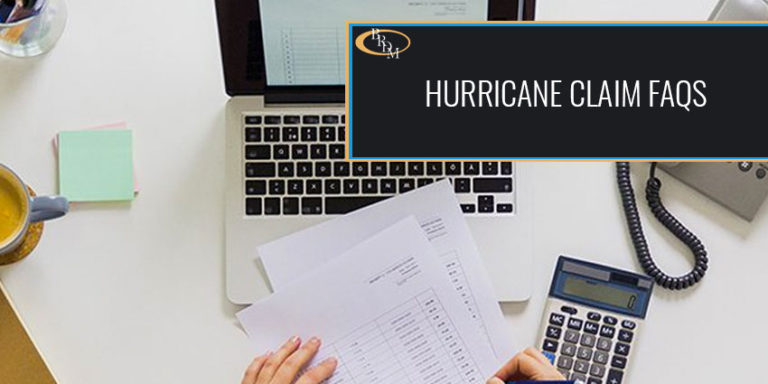These answers to Hurricane Insurance claim frequently asked questions can help guide you through the process. As property damage lawyers who have previously worked in the insurance industry, we know all their tricks. These answers to common questions can help stay ahead of the game to get the maximum possible settlement.
Table of Contents
- Hurricane Insurance FAQs
- How Do I Make a Hurricane Insurance Claim?
- What Should I Do If My Hurricane Insurance Claim Was Undervalued?
- What Should I Do If My Hurricane Insurance Claim Was Denied?
- What Happens If My Insurer Isn’t Responding to My Claim?
- How Long After a Hurricane Can You File an Insurance Claim in Florida?
- What Can Make My Hurricane Insurance Claim Stronger?
- What Should I Do If I Don’t Understand My Insurance Policy?
- Can You Use a Property Damage Attorney?
- What If They Say My Policy Doesn’t Cover the Damage, But It Does?
- What Happens If I Discover Damage After I Make the Claim?
- What Is The Difference Between Water Damage and Flood Damage?
- Is Wind Damage Covered in Homeowners’ Insurance Policies?
- Do I Need to Make Repairs Myself?
- What If I’m Told My Deductible Is Higher Than It Actually Is?
- How Can I Pay for Living Expenses If My Home Is Inhabitable?
- Contact a Hurricane Ian Insurance Claim Lawyer Today
Hurricane Insurance FAQs
How Do I Make a Hurricane Insurance Claim?
To file a hurricane insurance claim, you need to contact and notify your insurance company as soon as possible. Notifying them quickly ensures that it’s easy to prove the link between the damage and the storm.
Your insurer’s website or policy documents should provide you with the number to call. You’ll need your policy number and contact details, such as your email address and phone number.
You should also give a full description of the hurricane damage. Be as detailed as possible, but never admit faults you may have made that led to it.
For example, you may get asked “Did you leave any windows open?”. The answer here is “no”. If you say, “I don’t think so, maybe?”, then your claim could be outright denied.
You should also explain any special needs of your family, such as if you have young children that desperately need somewhere to stay or eat.
What Should I Do If My Hurricane Insurance Claim Was Undervalued?
If your insurance company has given you a lowball, insufficient offer then do not accept it. Contrary to popular belief, you always have the chance to negotiate with insurance companies.
By coming back with more evidence and an independent adjuster review, you can prove that the offer was too low.
The best thing to do now is to call an experienced property damage attorney, who can handle the case on your behalf and use their resources to prove the offer was too low. We welcome you to call us for a free consultation.
Read our guide on How to Determine the Value of Your Hurricane Damage Claim here.
Should I Sign a Release From My Insurance Company?
Never sign a release without first talking to a lawyer. Releases are used so that insurers can lowball their customers and avoid having to pay more when the customer later realizes it wasn’t enough.
What Should I Do If My Hurricane Insurance Claim Was Denied?
If your hurricane insurance claim has been denied, contact a property damage attorney as soon as possible.
You always have a second chance to negotiate and challenge their denial. They often make mistakes or even outright lie about why the claim has been denied. With more evidence and policy knowledge, you can come back and make another claim.
Read our guide on undervalued and denied Hurricane Ian Insurance claims here.
What Happens If My Insurer Isn’t Responding to My Claim?
Insurance companies must respond to hurricane claims within the following deadlines:
- Acknowledge and respond to your communication within 14 days.
- Must start investigating your claim within 10 days of receiving your ‘proof of loss’ submission.
- Must approve or deny your claim within 90 days.
Naturally, after a natural disaster, they’re working overtime to respond to claimants. You might not hear back immediately, especially if your property damage isn’t significant.
However, if these deadlines pass without a response then you should contact the company or contact a property damage attorney for help. Delaying tactics are commonly used by insurers to make claimants panic into accepting a lowball offer.
How Long After a Hurricane Can You File an Insurance Claim in Florida?
We advise you to contact the insurance company as soon as possible.
What Can Make My Hurricane Insurance Claim Stronger?
The following steps can ensure there is sufficient evidence for your claim to result in a satisfactory settlement:
- Take photos and videos of the damage, extensively.
- Look for water damage behind appliances and furniture.
- Keep all receipts.
- Keep records of who you are talking to and notes of what they tell you.
- Review all documents carefully.
- Contact a property damage lawyer.
- Use an independent adjuster (can be provided through your lawyer).
What Should I Do If I Don’t Understand My Insurance Policy?
Insurance policies are complicated by nature but also intentionally so that customers are left confused and often exploited in times of need.
A hurricane damage attorney will be happy to review your insurance policy documents to understand what type of coverage you have.
Can You Use a Property Damage Attorney?
Yes. We’ve seen cases in the past where the insurance agents have lied and told claimants that if they use an attorney then their contract will be voided. This is nonsense. You can always talk and use the assistance of a property damage lawyer.
What If They Say My Policy Doesn’t Cover the Damage, But It Does?
This is a common bad-faith tactic used by insurance companies trying to minimize their expenses.
Bad-faith tactics are illegal and can result in lawsuits. You can challenge the insurance company alone, but the best thing to do is to hire a property damage attorney. Your insurer will stand up and take things seriously the second they realize an attorney is involved.
What Happens If I Discover Damage After I Make the Claim?
If you discover property damage in the days, weeks or even months after the hurricane you may be able to file a supplemental claim. Hurricane damage often arises over time, due to the humidity and water involved. It may include:
- Water stains
- Buckling or warped walls and floors
- Structural issues
- Musty odors
- Severe mold
- Electronic problems
- Loose roof shingles
What Is The Difference Between Water Damage and Flood Damage?
Water damage is caused by internal issues in the home, such as plumbing disasters or appliance leaks.
Flood damage is caused by mother nature’s external forces, such as storm surge or river flooding.
The two require separate insurance policies. If a hurricane causes flooding in your home, it will not be covered by your homeowners insurance hurricane policy. Instead, it requires a separate flood damage policy.
Read our full guide on the Difference Between Water Damage & Flood Damage here.
Is Wind Damage Covered in Homeowners’ Insurance Policies?
Homeowners’ insurance typically covers damage caused by wind. However, some carriers may have a separate hurricane deductible.
Do I Need to Make Repairs Myself?
You are not expected to make major repairs, but you should make necessary repairs to mitigate further damage. Do not make major repairs.
For example, if your windows are smashed or the door is broken, it should be replaced or boarded up to prevent further damage to the property.
If your home has minor damage, such as the loss of shingles, you should get a professional to repair the roof to prevent further damage from occurring (such as water leaking through).
Failure to make these repairs can result in all or part of your claim being denied.
Always take pictures of the repairs and keep receipts of the repair team hiring or material you used, so that you can be reimbursed via your hurricane insurance claim.
What If I’m Told My Deductible Is Higher Than It Actually Is?
Hurricane deductibles in Florida are usually based on the amount of insurance coverage under Coverage A. For example, if your Coverage A insurance limit is $300,000, then a 2% deductible is $6,000.
Insurers in Florida offer several deductible options, such as $500, 2%, 5% and 10% of the Coverage A limit. Lower deductibles have higher premiums attached.
Sadly, there are a lot of situations where you file a claim for $4,000 but then find out the deductible is higher, so you have to pay for the repairs yourself. Sadly, this is legal.
However, if you feel something isn’t right then consider speaking to a or a property damage attorney who can check everything is in order.
How Can I Pay for Living Expenses If My Home Is Inhabitable?
Most homeowners’ policies should cover additional living expenses, including finding temporary shelter.
If your home is so severely damaged that you can no longer stay in it, your insurer should be organized or cover the costs when finding somewhere to stay. Call them as soon as possible.
Contact a Hurricane Ian Insurance Claim Lawyer Today
Free Consultations!
If you need to file, challenge or negotiate a Hurricane Ian insurance claim, our Florida property damage attorneys can help.
Attorney Jonathon Douglas leads the property damage claim team nationally ranked by US News and World Reports as a Tier 1 Law Firm, Battaglia Ross Dicus & McQuaid, P.A.
Having previously represented some of the largest insurance companies in the State of Florida, Mr. Douglas uses his inside knowledge and experience to help navigate hurricane insurance disputes.
Regardless of your situation, you can receive a free consultation today.



